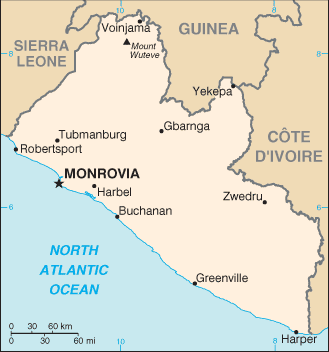Africa > Liberia: Weather, Map, Costs and Travel Guide

Warning: high risk destination.
Liberia : When and where to go?
Click on a city for complete climate and weather tables
| Town | Jan | Feb | Mar | Apr | May | June | July | Aug | Sept | Oct | Nov | Dec |
| Monrovia |  |  |  |  |  |  |  |  |  |  |  |  |
Liberia: Climate & Weather
The climate divides the year into two periods: a dry season that lasts from November to April, and a rainy season between May and October when severe thunderstorms occur regularly.
It is best to visit the country during the dry season.
Weather today

Light Rain
max. 29 °C
min. 25 °C
Wind: 5 km/h
Precipitation forecast: 2,8 mm
> Full report and 7-days forecast
Data updated at 11:29 (local time)
At that time, the weather was:
 29 °C / Partly Cloudy
29 °C / Partly Cloudy
Liberia: Map

Sponsored links
What to do in Liberia
Several sites really deserve your visit: the capital Monrovia can be your first stop. You will discover the National Museum, the former Masonic Temple, the Botanical Garden and the Zoo, and stroll through the narrow streets and maze of the Waterside Market.
The beaches are particularly beautiful, and you can relax on Monravia, Robertsport and Buchanan, which is the second largest port in the country: watch out for the latter, the ocean can be there dangerous.
To discover absolutely, the national park of Mount Nimba, with the luxuriant forest that covers its slopes, rich of fauna and an extraordinary flora, and the savannahs around.
Another interesting natural site is the swamps of Lake Piso, forming one of the largest lagoons in Africa and home to multiple animal species, fish and birds.
Do not miss the fabulous falls of Kpatawi, the pools around Gbanga, the many rubber plantations, and discover during your visits the rich crafts of the country and the dances proper to each tribe that sign the many festive events. Without forgetting the local cuisine that will fill the most difficult!
The beaches are particularly beautiful, and you can relax on Monravia, Robertsport and Buchanan, which is the second largest port in the country: watch out for the latter, the ocean can be there dangerous.
To discover absolutely, the national park of Mount Nimba, with the luxuriant forest that covers its slopes, rich of fauna and an extraordinary flora, and the savannahs around.
Another interesting natural site is the swamps of Lake Piso, forming one of the largest lagoons in Africa and home to multiple animal species, fish and birds.
Do not miss the fabulous falls of Kpatawi, the pools around Gbanga, the many rubber plantations, and discover during your visits the rich crafts of the country and the dances proper to each tribe that sign the many festive events. Without forgetting the local cuisine that will fill the most difficult!
Liberia: The basics
A visa is required to enter the territory, as well as a passport valid for another 6 months after the scheduled date of your return.
The current currency is the Liberian dollar (LRD).
Transport: You will arrive by plane to Roberts International Airport about fifty kilometers from the capital. There are 4 flights a week from Brussels.
To move around the country, it is better to hire a car with a local driver because the roads are in poor condition. There is no railway network, and public transport is not at all reliable.
Health: It is strongly advised to drink only boiled water or bottled water, and not to eat raw vegetables, fruits or crustaceans. Meat and fish must be eaten well cooked. Vaccination against yellow fever is mandatory, but it is prudent to have more universal vaccinations as well as those against hepatitis A and B and meningitis. Also take anti-malarial treatment and protect yourself from mosquitoes. Finally, the fight against Ebola is still current in the country, so learn more about this before leaving for Liberia.
Security: In addition to the health hazards associated with Ebola, a number of areas are discouraged following the 2003 civil war, particularly the border region with Côte d'Ivoire. It is also not advisable to travel alone because crime is still very present.
Shopping: you can bring back many handicrafts, such as embroidered clothing, bowls, wooden vases, masks, jewelry
The current currency is the Liberian dollar (LRD).
Transport: You will arrive by plane to Roberts International Airport about fifty kilometers from the capital. There are 4 flights a week from Brussels.
To move around the country, it is better to hire a car with a local driver because the roads are in poor condition. There is no railway network, and public transport is not at all reliable.
Health: It is strongly advised to drink only boiled water or bottled water, and not to eat raw vegetables, fruits or crustaceans. Meat and fish must be eaten well cooked. Vaccination against yellow fever is mandatory, but it is prudent to have more universal vaccinations as well as those against hepatitis A and B and meningitis. Also take anti-malarial treatment and protect yourself from mosquitoes. Finally, the fight against Ebola is still current in the country, so learn more about this before leaving for Liberia.
Security: In addition to the health hazards associated with Ebola, a number of areas are discouraged following the 2003 civil war, particularly the border region with Côte d'Ivoire. It is also not advisable to travel alone because crime is still very present.
Shopping: you can bring back many handicrafts, such as embroidered clothing, bowls, wooden vases, masks, jewelry



